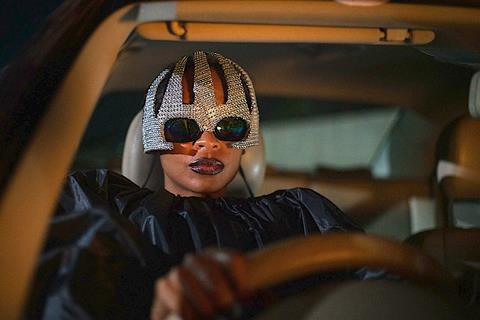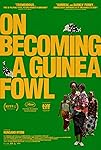Eye For Film >> Movies >> On Becoming A Guinea Fowl (2024) Film Review
On Becoming A Guinea Fowl
Reviewed by: Amber Wilkinson

Welsh-Zambian filmmaker Rungano Nyoni delivers another punch to the patriarchy in her follow up to I Am Not A Witch. While her latest film unfolds against a backdrop of Zambian customs, her exploration of the way that codes of silence can protect a predator, especially in a family environment, has much wider resonance.
Shula (Susan Chardy) - who, in a way that is starting to suggest an ‘Everywoman’ trend, shares a first name with the protagonist of Nyoni’s debut - is travelling home from a fancy dress party in a space-age get-up when she sees the body of her Uncle Fred lying in the road. Her reaction is curiously muted, as she phones, first her mother (Doris Naulapwa) and then, when she doesn’t pick up, her father (Henry BJ Phiri), who almost immediately presses her for some cash. The air of absurdity is further fuelled by the arrival of Shula’s drunk cousin Nsansa (Elizabeth Chisela), whose reaction to the body is differently odd.
As news of the death spreads, Shula’s attempts to return to her middle-class work bubble are thwarted by a cohort of “aunties”, who insist she must play an integral part in the funeral. Back home, the extended family have gathered and are already in the business of ostracising her uncle’s young wife as much as possible, while crying performatively. This performance, it turns out, is carefully observed by the older generation, who are more than happy to call out those who are either not showing sufficient grief or who are judged to be shedding their tears in the wrong fashion.
This policing of custom is part and parcel of a film that suggests traditions can be toxic, especially when it comes to a failure to acknowledge wrongdoing. Fred’s crimes are gradually revealed, as the younger members of the family, including Shula’s younger cousin Bupe (Esther Singini) begin to share their experiences.
Nyoni expertly controls her narrative so that it glides effortlessly between the reality of the funeral preparations to the more surreal psychological trauma Shula is working through. She walks twice through a flood, though the second is one borne out of her imagination. The absurd and the actual are also brought strikingly together in a moment when Shula is making a panicked hunt for Bupe but keeps being waylaid by various uncles demanding that she fetch them elaborate plates of food. The writer/director also knows how to move the mood, so that a pantry becomes a haven and a surprising venue for forgiveness. Music is also key, from the dislocating scoring from Lucrecia Dalt at certain moments to the beautiful acapella singing of the aunties, restoring an emotional harmony of sorts.
As with her first film, this is not simply a case of the finger being pointed at men - Nyoni also indicates that women are complicit. “Don’t tell anyone,” Shula is told when she tries to break the silence. Guinea Fowl - which crop up periodically in a children’s TV show linked to Shula’s trauma - are said to be “talkative creatures” who are useful as a warning system to the other animals. It seems that all depends on whether those other animals want to listen or not.
Reviewed on: 05 Dec 2024

















